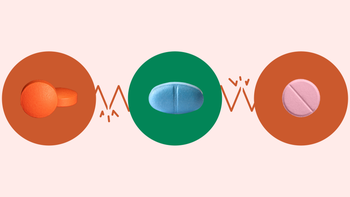
Is Ibuprofen Bad for Your Liver and Kidneys?
Ibuprofen isn't usually a problem for the liver, but it can cause kidney damage.
Because of how ibuprofen is broken down in the body, it doesn’t usually cause liver damage. But people with a history of liver problems, or who are taking other medications that cause liver damage, should talk to a healthcare professional before trying it, just to be cautious.
However, ibuprofen can cause kidney damage, especially for older adults and those with kidney disease. If you have kidney problems, ibuprofen may not be the safest option.
Ibuprofen is different from acetaminophen (the main ingredient in Tylenol). Acetaminophen tends to have a greater impact on the liver, but has little effect on the kidneys.
 BEST ANSWER
BEST ANSWERIbuprofen’s effects on the liver and kidneys have been extensively studied over several decades. All available studies support this answer.
48
6
48
6
Table of contents

We often think of over-the-counter (OTC) medications as safe medications that have a low risk of problems. But no medication is totally risk-free. All medications, including OTC products, have side effects to be aware of.
One well-known OTC pain reliever is ibuprofen (Advil, Motrin). This nonsteroidal anti-inflammatory drug (NSAID) is a common choice for fevers and mild aches or pains. But how much is OK to take? And is ibuprofen bad for your liver or kidneys?
Here, we’ll review some general information about how medications like ibuprofen affect the liver and kidneys.
Save over 40% on Qsymia with GoodRx
Discover the once daily Qsymia for weight management. Qsymia is for adults and children 12-17 in combination with a healthy diet and regular exercise.

Is ibuprofen bad for your liver?
Not usually. Ibuprofen and other NSAIDs rarely affect the liver. It’s estimated that between 1 and 10 out of every 100,000 people experience liver damage with NSAIDs. For most people, the NSAIDs available today pose little risk for liver damage.
Liver problems with NSAIDs have a higher likelihood of happening to people who already have a higher risk for experiencing liver damage. For example, you may have a greater risk if you have a history of liver problems like hepatitis C. There’s also an increased risk if you’re taking other medications that can cause liver damage.
Ibuprofen can elevate liver enzymes (blood tests that help estimate your liver function). These elevations usually cause no symptoms and typically only happen when people are taking higher doses (2,400 mg per day or more). If a person stops taking ibuprofen, their liver enzyme levels should return to normal with no long-term harm done. But if you have existing liver problems, these changes could be more worrisome.
So, if you have problems with your liver, or take other medications that cause liver damage, talk to your prescriber. They’ll be the best person to tell you whether ibuprofen is likely safe for you.
Other side effects to consider: Kidney damage is a potentially serious side effect of ibuprofen (Advil, Motrin). Read more about ibuprofen’s potential side effects — from heartburn to swelling — and how to manage them.
The right dose: Taking too much ibuprofen raises your risk of kidney damage and other serious side effects. Taking the recommended ibuprofen dosage can help lower the risk of these complications.
Comparing pain relievers: Acetaminophen (Tylenol) may be safer than ibuprofen if you have kidney problems. Compare acetaminophen versus ibuprofen and when one might be a better option than the other.
Is ibuprofen bad for your kidneys?
While it rarely affects the liver, ibuprofen can impact your kidneys. Here’s the science behind the problem.
Ibuprofen and other NSAIDs block a process in the body called the cyclooxygenase (COX) pathway. The COX pathway is involved in creating pain and swelling. But it’s also involved in helping blood to flow to the kidneys.
Blocking the COX pathway can narrow blood vessels leading to the kidneys. If this happens, then less oxygen reaches the kidneys. And that can cause acute (sudden) kidney injury.
Acute kidney injury can happen with any NSAID, including ibuprofen. There are several groups of people with a higher risk for experiencing kidney damage with NSAIDs, including older adults and people who have chronic kidney disease (CKD). This serious side effect is seen most often within the first month of starting a regular NSAID regimen.
The good news is these effects are reversible if you stop taking NSAIDs. But if you continue taking these medications after developing kidney damage, it can lead to CKD in the long term.
Acute kidney injury from NSAIDs may not cause any symptoms. If you’re taking ibuprofen for long periods of time, discuss with your healthcare team whether you should go for regular kidney function tests.
Read more like this
Explore these related articles, suggested for readers like you.
How much ibuprofen can you take?
The maximum dose of ibuprofen depends on whether you’re purchasing it OTC or have a prescription from a licensed healthcare professional. It’s important to take all sources of ibuprofen into account when determining your total daily dose. Ibuprofen is a common ingredient in many combination cough, cold, and pain medications. Always check the label to see if ibuprofen is an active ingredient.
When self-treating with OTC ibuprofen, adults and children, ages 12 and older, can take 200 mg to 400 mg by mouth every 4 to 6 hours. You shouldn’t take more than 1,200 mg in a 24-hour period.
Ibuprofen dosages for children between 2 and 11 years old are based on their age and body weight. Follow the directions on the OTC label carefully. Ask your child’s pediatrician if you’re not sure how much to give your child. You should also contact their pediatrician if your child is under the age of 2. They can provide you with a safe dosage based on their age, body weight, and symptoms.
When a licensed healthcare professional prescribes ibuprofen, the dose may be much higher than the OTC recommendations. Adults may be instructed to take up to 3,200 mg per day. Follow the instructions on your prescription label and don’t take more than what's prescribed.
Can you take ibuprofen every day?
This is a question best answered by your healthcare team. There are health conditions that require people to take NSAIDs most days or every day. But if you’re self-treating with OTC ibuprofen, the FDA recommends only taking it for a short period of time without talking to your prescriber.
It’s best to take OTC ibuprofen for no more than 10 days at a time for pain and no more than 3 days for a fever. If your symptoms get worse after starting ibuprofen, contact a healthcare professional.
Tylenol (acetaminophen) vs. NSAIDs: Which is safer for the liver and kidney?
Many people confuse acetaminophen (Tylenol) and ibuprofen. This is because they can treat many of the same symptoms. But there are key differences between ibuprofen and acetaminophen, especially when it comes to how they affect the liver and kidneys.
Which pain reliever is safer for the liver?
Ibuprofen is safer for the liver than acetaminophen.
The liver is the main organ responsible for breaking down acetaminophen. When taken occasionally, and at recommended doses (no more than 4,000 mg per day for most adults), it shouldn’t cause liver damage. But if you have a history of liver problems, it’s usually recommended to avoid acetaminophen.
Which pain reliever is safer for the kidneys?
Acetaminophen is safer for the kidneys than ibuprofen.
Acetaminophen doesn’t have the same effect on the COX pathway as ibuprofen. So kidney damage is much more rare. Kidney issues are typically only reported when a person has taken too much acetaminophen. If you have CKD or other kidney problems, consider acetaminophen as a safer alternative to ibuprofen.
So, is ibuprofen bad for you?
For most people, occasional use of ibuprofen is considered safe. Just make sure to stick within the recommended doses and only use it for a few days. If you have kidney problems or take other medications that can cause kidney damage, discuss whether ibuprofen is right for you with your healthcare team. You should also talk with a healthcare professional if you have a history of liver problems or take medications that cause liver damage.
The bottom line
Ibuprofen (Advil, Motrin) is a common over-the-counter (OTC) medication. While it doesn’t usually cause liver damage, it can have a negative impact on the kidneys. It’s important to follow OTC dosing instructions, as this can help lower your risk of side effects, including kidney damage. Keep in mind that ibuprofen isn’t right for everyone. If you’re unsure, it’s always best to speak with a healthcare professional. They’ll be able to tell you whether ibuprofen is safe for you.
Why trust our experts?


References
Bessone, F. (2010). Non-steroidal anti-inflammatory drugs: What is the actual risk of liver damage?. World Journal of Gastroenterology.
Klomjit, N., et al. (2022). Acute kidney injury associated with non-steroidal anti-inflammatory drugs. European Journal of Internal Medicine.
National Institute of Diabetes and Digestive and Kidney Diseases. (2018). Ibuprofen. LiverTox: Clinical and Research Information on Drug-Induced Liver Injury.
National Institute of Diabetes and Digestive and Kidney Diseases. (2020). Nonsteroidal antiinflammatory drugs (NSAIDs). LiverTox: Clinical and Research Information on Drug-Induced Liver Injury.
Park, W. Y. (2020). Controversies in acetaminophen nephrotoxicity. Kidney Research and Clinical Practice.
U.S. Food and Drug Administration. (2015). Use caution with pain relievers.
U.S. Food and Drug Administration. (2016). Ibuprofen drug facts label.




























